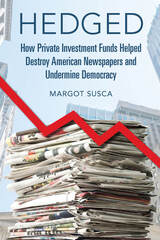5 books about Anglicans
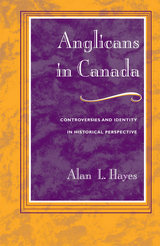
Anglicans in Canada
Controversies and Identity in Historical Perspective
Alan L. Hayes
University of Illinois Press, 2004
From the first worship services onboard English ships during the sixteenth century to the contentious toughmindedness of early clergymen to current debates about sexuality, Alan L. Hayes provides a comprehensive survey of the history of the Canadian Anglican Church. Unprecedented in the annals of Canadian religious history, it examines whether something like an Anglican identity emerged from within the changing forms of doctrine, worship, ministry, and institutions.
With writing that conveys a strong sense of place and people, Hayes ultimately finds such an identity not in the relatively few agreements within Anglicanism but within the disagreements themselves. Including hard-to-find historical documents, Anglicans in Canada is ideal for research, classroom use, and as a resource for church groups.
With writing that conveys a strong sense of place and people, Hayes ultimately finds such an identity not in the relatively few agreements within Anglicanism but within the disagreements themselves. Including hard-to-find historical documents, Anglicans in Canada is ideal for research, classroom use, and as a resource for church groups.
[more]

Catholics, Anglicans, and Puritans
Seventeenth-Century Essays
Hugh Trevor-Roper
University of Chicago Press, 1988
Renaissance Essays, published in 1985, confirmed Hugh Trevor-Roper's reputation as one of the most distinguished writers of history and as an unequaled master of the historical essay. Received with critical acclaim in both England and the United States, the volume gathered wide-ranging essays on both British and European history from the fifteenth century to the early seventeenth centuries. This sequel, Catholics, Anglicans, and Puritans, is composed of five previously unpublished essays on the intellectual and religious movements which lay behind the Puritan revolution in England and Ireland.
The opening essay, a skillful work of historical detection, investigates the strange career of Nicholas Hill. In "Laudianism and Political Power," Trevor-Roper returns to the subject of his first, now classic, book. He analyzes the real significance of the ecclesiastical movement associated with Archbishop Laud and speculates on what might have happened if the Stuarts had not abandoned it. "James Ussher, Archbishop of Armagh" deals with a key figure in the intellectual and religious life of his time. A long essay on "The Great Tew Circle" reinstates Lord Falkland as an important influence on the continuity of ideas through the English revolution. The final essay reassesses the political ideology of Milton.
English intellectual history, as Trevor-Roper constructs it here for the seventeenth century, is conditioned by its social and political context. Always engaging and fresh, these essays deal with currently interesting historical topics and up-to-date controversies.
The opening essay, a skillful work of historical detection, investigates the strange career of Nicholas Hill. In "Laudianism and Political Power," Trevor-Roper returns to the subject of his first, now classic, book. He analyzes the real significance of the ecclesiastical movement associated with Archbishop Laud and speculates on what might have happened if the Stuarts had not abandoned it. "James Ussher, Archbishop of Armagh" deals with a key figure in the intellectual and religious life of his time. A long essay on "The Great Tew Circle" reinstates Lord Falkland as an important influence on the continuity of ideas through the English revolution. The final essay reassesses the political ideology of Milton.
English intellectual history, as Trevor-Roper constructs it here for the seventeenth century, is conditioned by its social and political context. Always engaging and fresh, these essays deal with currently interesting historical topics and up-to-date controversies.
[more]
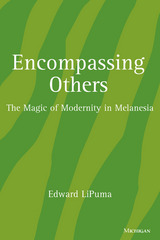
Encompassing Others
The Magic of Modernity in Melanesia
Edward LiPuma
University of Michigan Press, 2001
An engaging, beautifully written account by an ethnographer who lived in the mountains of Papua New Guinea, Encompassing Others is at once a history of the encounter of two cultures and an attempt to challenge theoretically the main concepts that have informed the study of modernity. Going beyond accounts that grasp modernity solely in terms of domination, imperialism, and local resistance, it explores how capitalism, Christianity, and mass commercial culture enchant the senses, create a carnival of new goods, and open up new possibilities for thought and action.
Focusing on the Maring people of Highland New Guinea and on the Westerners who interacted with them, Edward LiPuma presents issues from the perspectives of both sides. We hear the voice of the Anglican priest from San Francisco as well as the most powerful Maring shamans. Further, the book seeks to develop a theory of generations that helps explain how change accelerates and societies take on new directions across generations.
Theoretical, descriptive, but almost entirely free of jargon, this book is intended for all those who are interested in how the West's encompassment of other peoples influences how these others conceive of their past, imagine their future, and experience the present. It will have wide appeal for anthropologists and others concerned with colonialism, globalization, and the formation of the nation-state.
Edward LiPuma is Professor and Chair, Department of Anthropology, University of Miami.
Focusing on the Maring people of Highland New Guinea and on the Westerners who interacted with them, Edward LiPuma presents issues from the perspectives of both sides. We hear the voice of the Anglican priest from San Francisco as well as the most powerful Maring shamans. Further, the book seeks to develop a theory of generations that helps explain how change accelerates and societies take on new directions across generations.
Theoretical, descriptive, but almost entirely free of jargon, this book is intended for all those who are interested in how the West's encompassment of other peoples influences how these others conceive of their past, imagine their future, and experience the present. It will have wide appeal for anthropologists and others concerned with colonialism, globalization, and the formation of the nation-state.
Edward LiPuma is Professor and Chair, Department of Anthropology, University of Miami.
[more]
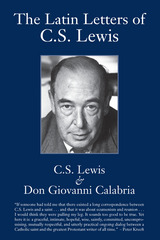
The Latin Letters of C.S. Lewis
C.S. Lewis and Don Giovanni Calabria
St. Augustine's Press, 2009
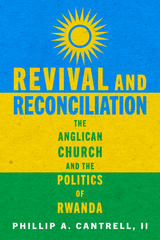
Revival and Reconciliation
The Anglican Church and the Politics of Rwanda
Phillip A. Cantrell II
University of Wisconsin Press, 2022
When Europe began colonizing Rwanda in the late nineteenth century, the Anglican Church played a significant and long-lasting role in controlling the colony through the Ruanda Mission. This informative volume shows how the church repeatedly aligned with the regime in power and failed to take account of its own history in fomenting ethnic tensions prior to the 1994 genocide. In recent years, the media has depicted Rwanda as a model of unity, development, and recovery, yet Phillip A. Cantrell II argues that not all is as it seems, as he takes a critical look at the church's complicity with authoritarian rule—from the Tutsi monarchy to the Rwandan Patriotic Front.
Drawing from new archival materials as well as on-the-ground field research, Revival and Reconciliation is a Rwanda-centered account of the country's ecclesiastical and national historiography. Cantrell calls attention to the harms the postgenocide church risks doing should it continue to support false narratives about Rwanda's colonial and postcolonial past—with dangerous consequences for the future.
Drawing from new archival materials as well as on-the-ground field research, Revival and Reconciliation is a Rwanda-centered account of the country's ecclesiastical and national historiography. Cantrell calls attention to the harms the postgenocide church risks doing should it continue to support false narratives about Rwanda's colonial and postcolonial past—with dangerous consequences for the future.
[more]
READERS
Browse our collection.
PUBLISHERS
See BiblioVault's publisher services.
STUDENT SERVICES
Files for college accessibility offices.
UChicago Accessibility Resources
home | accessibility | search | about | contact us
BiblioVault ® 2001 - 2024
The University of Chicago Press





